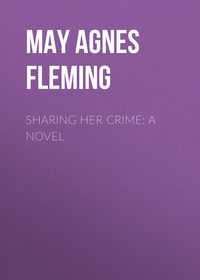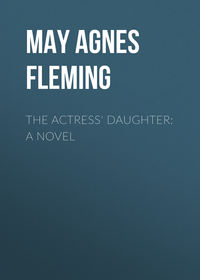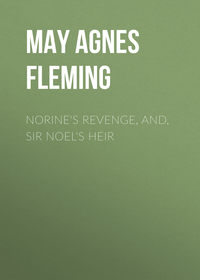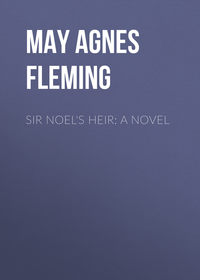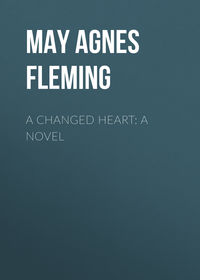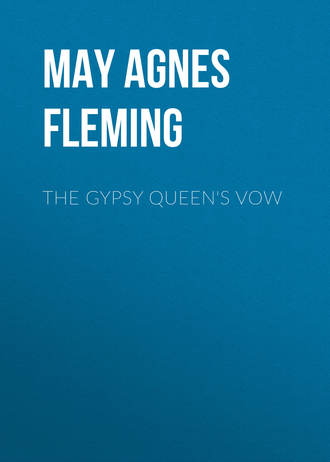 полная версия
полная версияThe Gypsy Queen's Vow

May Agnes Fleming
The Gypsy Queen's Vow
CHAPTER I.
NIGHT AND STORM
“The night grows wondrous dark; deep-swelling gustsAnd sultry stillness take the rule by turn,While o’er our heads the black and heavy cloudsRoll slowly on. This surely bodes a storm.”– Baillie.Overhead, the storm-clouds were scudding wildly across the sky, until all above was one dense pall of impenetrable gloom. A chill, penetrating rain was falling, and the wind came sweeping in long, fitful gusts – piercingly cold; for it was a night in March.
It was the north road to London. A thick, yellow fog, that had been rising all day from the bosom of the Thames, wrapped the great city in a blackness that might almost be felt; and its innumerable lights were shrouded in the deep gloom. Yet the solitary figure, flitting through the pelting rain and bleak wind, strained her eyes as she fled along, as though, despite the more than Egyptian darkness, she would force, by her fierce, steady glare, the obscure lights of the city to show themselves.
The night lingered and lingered, the gloom deepened and deepened, the rain plashed dismally; the wind blew in moaning, lamentable gusts, penetrating through the thick mantle she held closely around her. And still the woman fled on, stopping neither for wind, nor rain, nor storm – unheeding, unfeeling them all – keeping her fierce, devouring gaze fixed, with a look that might have pierced the very heavens, on the still far-distant city.
There was no one on the road but herself. The lateness of the hour – for it was almost midnight – and the increasing storm, kept pedestrians within doors that cheerless March night. Now and then she would pass cottages in which lights were still glaring, but most of the houses were wrapped in silence and darkness.
And still on, through night, and storm, and gloom, fled the wanderer, with the pitiless rain beating in her face – the chill blasts fluttering her thin-worn garments and long, wild, black hair. Still on, pausing not, resting not, never removing her steadfast gaze from the distant city – like a lost soul hurrying to its doom.
Suddenly, above the wailing of the wind and plashing of the rain, arose the thunder of horses’ hoofs and the crash of approaching carriage wheels. Rapidly they came on, and the woman paused for a moment and leaned again a cottage porch, as if waiting until it should pass.
A bright light was still burning in the window, and it fell on the lonely wayfarer as she stood, breathing hard and waiting, with burning, feverish impatience, for the carriage to pass. It displayed the form of a woman of forty, or thereabouts, with a tall, towering, commanding figure, gaunt and bony. Her complexion was dark; its naturally swarthy hue having been tanned by sun and wind to a dark-brown. The features were strong, stern, and prominent, yet you could see at a glance that the face had once been a handsome one. Now, however – thin, haggard, and fleshless, with the high, prominent cheek-bones; the gloomy, overhanging brows; the stern, set, unyielding mouth; the rigid, corrugated brow; the fierce, devouring, maniac, black eyes – it looked positively hideous. Such eyes! – such burning, blazing orbs of fire, never was seen in human head before! They glowed like two live coals in a bleached skull. There was utter misery, there was despair unspeakable, mingled with fierce determination, in those lurid, flaming eyes. And that dark, stern terrific face was stamped with the unmistakable impress of a despised, degraded race. The woman was a gipsy. It needed not her peculiar dress, the costume of her tribe, to tell this, though that was significant enough. Her thick, coarse, jet-black hair, streaked with threads of gray, was pushed impatiently off her face; and her only head-covering was a handkerchief of crimson and black silk knotted under her chin. A cloak, of coarse, red woolen stuff, covered her shoulders, and a dress of the same material, but in color blue, reached hardly to her ankles. The brilliant head-dress, and unique, fiery costume, suited well the dark, fierce, passionate face of the wearer.
For an instant she paused, as if to let the carriage pass; then, as if even the delay of an instant was maddening, she started wildly up, and keeping her hungry, devouring gaze fixed on the vision of the still unseen city, she sped on more rapidly than before.
CHAPTER II.
MR. TOOSYPEGS
“He bears him like a portly gentleman;And, to say truth, Vernon brags of himTo be a virtuous and well-governed youth.”– Shakspeare.The vehicle that the gipsy had heard approaching was a light wagon drawn by two swift horses. It had two seats capable of holding four persons, though the front seat alone was now occupied.
The first of these (for his age claims the precedence) was a short, stout, burly, thick-set, little man, buttoned up in a huge great-coat, suffering under a severe eruption of capes and pockets. An immense fur cap, that, by its antediluvian looks, might have been worn by Noah’s grandfather, adorned his head, and was pulled so far down on his face that nothing was visible but a round, respectable-looking bottle-nose, and a pair of small, twinkling gray eyes. This individual, who was also the driver, rejoiced in the cognomen of Mr. Bill Harkins, and made it his business to take belated wayfarers to London (either by land or water), when arriving too late for the regular conveyances. On the present occasion his sole freight consisted of a young gentleman with a brilliant-hued carpet-bag, glowing with straw-colored roses and dark-blue lilies, rising from a back-ground resembling London smoke. The young gentleman was a very remarkable young gentleman indeed. He was exceedingly tall and thin, with legs like a couple of pipe-stems, and a neck so long and slender that it reminded you of a gander’s, and made you tremble for the safety of the head balanced on such a frail support. His hair and complexion were both of that indefinite color known to the initiated as “whity brown” – the latter being profusely sprinkled with large yellow freckles, and the former as straight and sleek as bear’s grease could make it. For the rest, he was characterized by nothing in particular, but for being the possessor of a pair of large, pale-blue eyes, not remarkable for either brilliancy or expression, and for wearing the meekest possible expression, of countenance. He might have been eighteen years old, as far as years went; but his worldly wisdom was by no means equal to his years.
“By jingo! that ’ere was a blast!” said Mr. Harkins, bending his head as a gale swept shrieking by.
“Yes, it does blow, but I don’t mind it – I’m very much obliged to you,” said the pale young man, with the white hair and freckles, holding his carpet-bag in his arms, as if it were a baby.
“Who said you did?” growled Bill Harkins. “You’ll be safe in Lunnon in half an ’our, while I’ll be a-drivin’ back through this ’ere win’ and rain, getting wetted right through. If you don’t mind it, I does, Mr. Toosypegs.”
“Mr. Harkins,” said Mr. Toosypegs, humbly, “I’m very sorry to put you to so much trouble, I’m sure, but if two extra crowns – ”
“Mr. Toosypegs,” interrupted Mr. Harkins, with a sudden burst of feeling, “give us yer hand; yer a trump. It’s easy to be perceived, them as is gentlemen from them as isn’t. You’re one o’ the right sort; oughter to be a lord, by jingo! Get up, hold lazybones,” said Mr. Harkins, touching the near-wheeler daintily with his whip.
“Mr. Harkins, it’s very good of you to say so, and I’m very much obliged to you, I’m sure,” said Mr. Toosypegs, gratefully; “but, at the same time, if you’ll please to recollect. I’m an American, and consequently couldn’t be a lord. There aren’t any lords over in America, Mr. Harkins; though if there was, I dare say I would be one. It’s real kind of you to wish it, though, and I’m much obliged to you,” added Mr. Toosypegs, with emotion.
“Hamerica must be a hodd sorter place,” said Mr. Harkins, reflectively. “I’ve heern tell that your king – ”
“He isn’t a king, Mr. Harkins; he’s only the President,” broke in Mr. Toosypegs, with energy.
“Well, President, then,” said Mr. Harkins, adopting the amendment with a look of disgust. “I’ve heern they call him ‘mister,’ jest like hany hother man.”
“So they do; and he glories in the triumphant title – a title which, as an American citizen’s, is a prouder one than that of king or kaiser!” said Mr. Toosypegs, enthusiastically, while he repeated the sentence he had read out of a late novel: “ – It is a title for which emperors might lay down their scepters – for which potentates might doff the royal purple – for which the great ones of the earth might – a – might’” – Mr. Toosypegs paused and knit his brows, having evidently lost his cue.
“Kick the bucket!” suggested Mr. Harkins, coming to his aid.
“Mr. Harkins, I’m very much obliged to you; but that wasn’t exactly the word,” said Mr. Toosypegs, politely, “ – Might’ – oh, yes! – ‘might resign name and fame, and dwell under the shadow of the American eagle, whose glorious wings extend to the four quarters of the earth, and before whose soul-piercing eye the nations of the world must blush forevermore!’”
And Mr. Toosypegs, carried away by national enthusiasm, gave his arm such a flourish that it came in contact with the head of Mr. Harkins, and set more stars dancing before his eyes than there would have been had the night been ever so fine.
The outraged Mr. Harkins indignantly sprung round, and collared Mr. Toosypegs, whose complexion had turned from whity-brown to gray, with terror, and whose teeth chattered with mingled shame and fear.
“You himpertanent wagabond!” shouted Mr. Harkins, “to go for to strike a hunnoffending man like that! Blessed! if I hain’t a good mind to chuck yer ’ead fust hout the waggin.”
“Mr. Har – Har – Harkins,” stammered the half-strangled advocate of the American eagle, “I didn’t mean to do it, I’m very much obliged to you! I do assure you, Mr. Harkins, I hadn’t the faintest idea of hitting you; and if money – ”
“How much?” demanded Mr. Harkins, fiercely, looking bayonets at his trembling victim.
“Mr. Harkins, if five or even ten dollars – ”
“Which is how many pounds?” demanded the somewhat mollified Mr. Harkins.
“Two pounds sterling,” said Mr. Toosypegs, in a trembling falsetto; “and I do assure you, Mr. Harkins, I hadn’t the faintest idea of hitting you that time. If two pound – ”
“Done!” cried Mr. Harkins. “Never say it ag’in. I ain’t a man to bear spite at no one – which is a Christian maxim, Mr. Toosypegs. A clip side the head’s neither here nor there. Same time, I’ll take them two-pound flimsies now, if’s all the same to you?”
“Certainly – certainly, Mr. Harkins,” said Mr. Toosypegs, drawing out a purse well-filled with gold, and opening it nervously. “Three – five – ten dollars, and two for the drive’s twelve; and one to buy sugar-plums for your infant family – if you’ve got such a thing about you – is thirteen. Here’s thirteen dollars, Mr. Harkins. I’m very much obliged to you.”
“Same to you, Mr. Toosypegs,” said Mr. Harkins, pocketing the money, with a broad grin. “‘May you ne’er want a frien,’ nor a bottle to give him,’ as the poic says.”
“Mr. Harkins, I’m obliged to you,” said Mr. Toosypegs, grasping his hand, which Mr. Harkins resigned with a grunt. “You have a soul, Mr. Harkins. I know it – I feel it. Everybody mightn’t find it out; but I can – I perceived it from the first.”
Mr. Harkins heard this startling fact with the greatest indifference, merely saying, “Humph!”
“And now, how far do you suppose we are from the city, Mr. Harkins!” said Mr. Toosypegs, in his most insinuating tone.
“’Bout a mile or so.”
“Could you recommend any hotel to me, Mr. Harkins. I’m a stranger in the city, you know, and should feel grateful if you would,” said Mr. Toosypegs, humbly.
“Why, yes, I can,” said Mr. Harkins, brightening suddenly up. “There’s the ‘Blue Pig,’ one of the finest ’otels in Lunnon, with the best o’ ’commodations for man and beast. You’ve heern o’ the ‘Blue Pig’ over there in Hamerica, hain’t you?”
Mr. Toosypegs wasn’t sure. It was very likely he had; but, owing to his bad memory, he had forgotten.
“Well, anyhow, you won’t find many ’otels to beat that ’ere. Best o’ ’commodation – but I told you that hafore.”
“Where is it located?” asked Mr. Toosypegs.
“St. Giles. You know where that is, in course – hevery-body does. The nicest ’otel in Lunnon – best o’ ’commodations. But I told you that hafore. My hold frien’ Bruisin’ Bob keeps it. You’ll like it, I know.”
“Yes, Mr. Harkins, I dare say I will. I am very much obliged to you,” said Mr. Toosypegs, in a somewhat dubious tone.
“That ’ere man’s the greatest cove a-goin’,” said Mr. Harkins, getting enthusiastic. “Been married ten times if he’s been married once. One wife died; one left his bread-board, and run hoff with a hofficer dragoon; one was lagged for stealin’ wipes, and he’s got three livin’ at this present writin’. Great fellar is Bob.”
“I haven’t the slightest doubt of it, Mr. Harkins,” said the proprietor of the freckles, politely; “and I anticipate a great deal of pleasure in making the acquaintance of your friends, Mr. and Mrs. Bob. But, good gracious! Mr. Harkins, just look there – if that ain’t a woman hurrying on there after,” said Mr. Toosypegs, pointing, in intense surprise, to the form of the gipsy, as she darted swiftly away from the cottage.
“Well, what o’ that? Some tramper a-goin’ to Lunnon,” said Mr. Harkins, gruffly.
“But, Mr. Harkins, a woman out in such a storm at this hour of the night! Why, it ain’t right,” said Mr. Toosypegs, getting excited.
Mr. Harkins picked up his hat, turned down the collar of his coat, faced abruptly round, and looked Mr. Toosypegs straight in the eyes.
“Do call to her to get in, Mr. Harkins. There’s plenty of room for her on the back seat,” said Mr. Toosypegs, unheeding Mr. Harkins’ astounded look at his philanthropy. “A woman traveling on foot in such a storm! Why, it ain’t right!” repeated Mr. Toosypegs, getting still more excited.
“Mr. Toosypegs, Hamericans don’t never be a little hout their mind, do they?” said Mr. Harkins, blandly.
“Not often, Mr. Harkins, I’m very much obliged to you,” said Mr. Toosypegs, with his customary politeness.
“Because if they did, you know,” said Mr. Harkins, in the same bland tone, “I should say you wasn’t quite right yourself, you know!”
“Good gracious! Mr. Harkins, what do you mean?” exclaimed Mr. Toosypegs, in a tone of mild remonstrance. “You don’t think I’m crazy, do you?”
“Mr. Toosypegs, I don’t like to be personal; so I’ll only say it’s my private opinion you’re a brick!” said Mr. Harkins, mildly. “Perhaps, though, its the hair of Hingland wot doesn’t agree with you. I thought you was wery sensible a little w’ile ago, when you gin me them two poun’.”
“I’m very much obliged to you for your good opinion, Mr. Harkins,” said Mr. Toosypegs, blushing. “And if you’ll only call to that woman to get into the wagon, I’ll be still more so.”
“And have your pockets picked?” said Mr. Harkins, sharply. “I shan’t do no sich thing.”
“Mr. Harkins!” said Mr. Toosypegs, warmly, “she’s a woman – ain’t she?”
“Well, wot if she be?” said Mr. Harkins, sullenly.
“Why, that no woman should be walking at this hour when men are riding; more particularly when there is a back seat with nobody in it. Why, it ain’t right!” said Mr. Toosypegs, who seemed unable to get beyond this point.
“Well, I don’t care!” said Mr. Harkins, snappishly. “Do you s’pose, Mr. Toosypegs, I have nothing to do but buy waggins to kerry sich lumber as that ’ere? I won’t do it for no one. Likely as not she’s nothin’ but a gipsy, or something as bad. This ’ere waggin ain’t goin’ to be perluted with no sich trash.”
“Mr. Harkins,” said Mr. Toosypegs, briskly, thrusting his hand into his pocket, “what will you take and bring her to London?”
“Hey? ‘A fool and his money’ – hum! What’ll you give?”
“There’s a crown.”
“Done!” said Mr. Harkins, closing his digits on the coin, while his little eyes snapped. “Hullo! you, woman!” he shouted, rising his voice.
The gipsy – who, though but a yard or so ahead, was indistinguishable in the darkness – sped on without paying the slightest attention to his call.
“Hallo, there! Hallo!” again called Mr. Harkins, while Mr. Toosypegs followed him:
“Stop a moment, if you please, madam.”
But neither for the sharp, surly order of the driver, nor the bland, courteous request of Mr. Toosypegs, did the woman stop. Casting a brief, fleeting glance over her shoulder, she again flitted on.
“You confounded old witch! Stop and take a ride to town – will you?” yelled the polite and agreeable Mr. Harkins, holding up a dark lantern and reining in his horse by the woman’s side.
The dark, stern face, with its fierce, black eyes and wildly-streaming hair, was turned, and a hard, deep voice asked what he wanted.
“A gipsy! I knew it!” muttered Mr. Harkins, shrinking involuntarily from her lurid glances. “Ugh! What a face! Looks like the witch in the play?” Then aloud: “Get in, ma’am, and I’ll take ye to town.”
“Go play your jokes on some one else,” said the woman, curtly, turning away.
“I ain’t a-jokin’. Nice time o’ night this to stop and play jokes – ain’t it?” said Mr. Harkins, in a tone of intense irony. “This ’ere young man, which is a Hamerican from the New Knighted States, has paid yer fare to Lunnon outer his hown blessed pocket. So jump in, and don’t keep me waitin’ here in the wet.”
“Is what he says true?” said the dark woman, turning the sharp light of her stiletto-like eyes on the freckles and pale-blue eyes of good-natured Mr. Toosypegs.
“Yes, ma’am. I’m happy to say it is,” said Mr. Toosypegs. “Allow me to hand you in.”
And Mr. Toosypegs got up to fulfill his offer; but Dobbin at that moment gave the wagon a malicious jerk, and dumped our patriotic American back in his seat. Before he could recover his breath, the gipsy had declined his assistance, with a wave of her hand, and had entered the wagon unassisted, and taken her seat.
“I know that tramper,” said Mr. Harkins in a nervous whisper to Mr. Toosypegs. “It’s the gipsy queen, Ketura, from Yetholm; most wonderful woman that ever was, ’cept Deborah, the woman the Bible tells about, you know, wot druv the nail through the fellar’s head when she found him takin’ a snooze. Heard a minister take her for his tex’ once, and preach all about it. Our cow’s name’s Deborah, too,” said Mr. Harkins, absently.
“And she’s a gipsy queen? Lord bless us!” exclaimed Mr. Toosypegs, turning round and looking in some alarm at the fixed, stern, dark face before him – like the face of a statue in bronze. “Does she tell fortunes?”
“Yes; but you’d better not hask her to-night,” said Mr. Harkins, in the same cautious whisper. “Her son’s in prison, and sentenced to transportation for life for robbin’ the plate of the Hearl De Courcy. He’s goin’ off with a lot of hothers airly to-morrow mornin’. Now, don’t go exclaiming that way;” said Mr. Harkins, in a tone expressive of disgust, as he gave his companion a dig in the side.
“Poor thing! poor thing!” said Mr. Toosypegs, in a tone of sympathy. “Why, it’s too bad; it really is, Mr. Harkins.”
“Sarved him right, it’s my opinion,” said Mr. Harkins, sententiously. “Wot business had he for to go for to rob Hearl de Courcy, I want ter know? His mother, the hold lady ahind here, went and sot him up for a gentleman, and see wot’s come hof hit. She, a hold gipsy queen, goin’ and sendin’ her son to Heton with hall the young lordses, and baronetses, and dukeses, and makin’ believe he was somethin’ above the common. And now see what her fine gentleman’s gone and done and come to. Wonder wot she’ll think of herself, when she sees him takin’ a sea voyage for the good of his ’ealth at the ’spense of the government, to-morrow?”
“Poor thing! poor thing!” said Mr. Toosypegs, looking deeply sorry.
“Poor hold thing hindeed!” said Mr. Harkins, turning up his nose contemptuously. “Sarved ’im right, I say ag’in. That ’ere son o’ hern was the most stuck-hup chap I ever clapped my two blessed heyes on. Hafter he left Heton, I see’d ’im, one day, in the streets, hand guess who with? W’y, with nobody less than young Lord Williers, honly son o’ the Hearl De Courcy, as he has gone and robbed. There’s hingratitude for you! I didn’t know ’im then; but I ’cognized him hafterward in the court-room hat ’is trial.”
“How could he afford to go to Eton – he, a gipsy?” said Mr. Toosypegs, in surprise.
“Dunno! Hold woman sent ’im, I s’pose – ’owever she got the money. He was a fine-looking fellow, too, I must say, though rayther tawny, but ’andsome as Lord Williers himself. Hold Ketura was ’andsome once, too; see’d ’er w’en she was a reg’lar hout-and-hout beauty; though you mightn’t think it now. Times changes folks, yer know,” said Mr. Harkins, in a moralizing tone.
“What made him steal, if his mother was so rich?” said Mr. Toosypegs.
“His mother wasn’t rich no more’n I be. S’pose she made enough tellin’ fortunes, poachin’, and stealin’ to pay fur’im at school; hand then when he growed hup, and his cash gave out, he took hand stole the hearl’s plate. He denied it hall hat ’is trial; but then they hall do that. By jingo! he looked fierce enough to knock the judge and jury, and all the rest on ’em, hinto the middle hof next week, hif not further, that day. ’Twas no go, though; hand hover the water he goes to-morrow.”
“Poor fellow! Mr. Harkins, I’m sorry for him – I really am,” said Mr. Toosypegs, in a tone of real sincerity.
Mr. Harkins burst into a gruff laugh.
“Well, hif this ain’t good! Wot fools folks is! Sorry for a cove yer never saw! Wonder hif hall Hamericans is as green as you be?”
After this sentence, which came out in a series of little jerks, with strong notes of admiration appended to each, Mr. Harkins relapsed into silence and the collar of his great-coat, and began whistling “The Devil Among the Tailors,” in a voice like a frog with the influenza.
They were now rapidly approaching the city – the loud crash and din of which had somewhat subsided, owing to the inclemency of the weather and the lateness of the hour. The gipsy, who had not heard a word of the foregoing conversation – it having been carried on in a prudently-subdued tone – had wrapped her coarse cloak closer around her, while the gaze of her devouring eyes grew more intense, as the lights of the city began to appear. One by one, they came gleaming out through the dense fog with bug-like stars here and there; and in every direction.
The city was gained; and they were soon in the very midst of the great, throbbing heart of mighty London.
The wagon stopped, and Mr. Toosypegs sprung out to assist the woman to alight.
But waving him away with an impatient motion, she sprung out unassisted, and without one word or look of thanks, turned and flitted away in the chill night wind.
“There! I knowed that would be all the thanks ye’d get,” said Mr. Harkins, with a hoarse chuckle. “Hoff she goes, and you’ll never see her again.”
“Well, that don’t matter any. I didn’t want thanks, I’m sure,” said the kind-hearted Mr. Toosypegs. “Good-by, Mr. Harkins. Give my respects to Mrs. Harkins.”
“Good-night, hold fellar,” said Mr. Harkins, giving Mr. Toosypegs’ hand a cordial shake. “You’re a brick! How I’d like to come hacross one like you hev’ry night! Go right to Bob’s, sign o’ the ‘Blue Pig,’ St. Giles, best o’ ’commodation for man and beast; but I told you that before. Tell Bob I sent you, and I’ll call and see you in a few days.”
“You’re very good, Mr. Harkins. I’ll certainly tell Mr. Bob so when I see him!” said Mr. Toosypegs, with a severe twinge of conscience at the deception he felt himself to be using; “and I’ll be very glad to see you whenever you call. I’m very much obliged to you.”
CHAPTER III.
THE LOVERS
“Oh, thou shalt be all else to me,That heart can feel, or tongue can feign;I’ll praise, admire, and worship thee,But must not, dare not, love again.”– Moore.While the solitary wagon was driving, through wind and rain, along the lonely north road, bearing its three strangely-contrasted inmates – the gruff, avaricious driver, the simple, kind-hearted youth, and the dark, fierce, stern woman – a far different scene was passing in another quarter of the city. At that same hour the town mansion of Hugh Seyton – Earl De Courcy – was all ablaze with lights, music and mirth. Gorgeous drawing-rooms, fretted with gold and carving, dazzling with numberless jets of light from the pendant chandeliers, odorous with the heavy perfume of costly exotics, the very air quivering with softest music, were thrown open, and were filled with the proud, the high-born, the beautiful, of London. Peers and peeresses, gallant nobles and ladies bright, moved through the glittering rooms, and with singing, talking, flirting, dancing, the night was waning apace.


